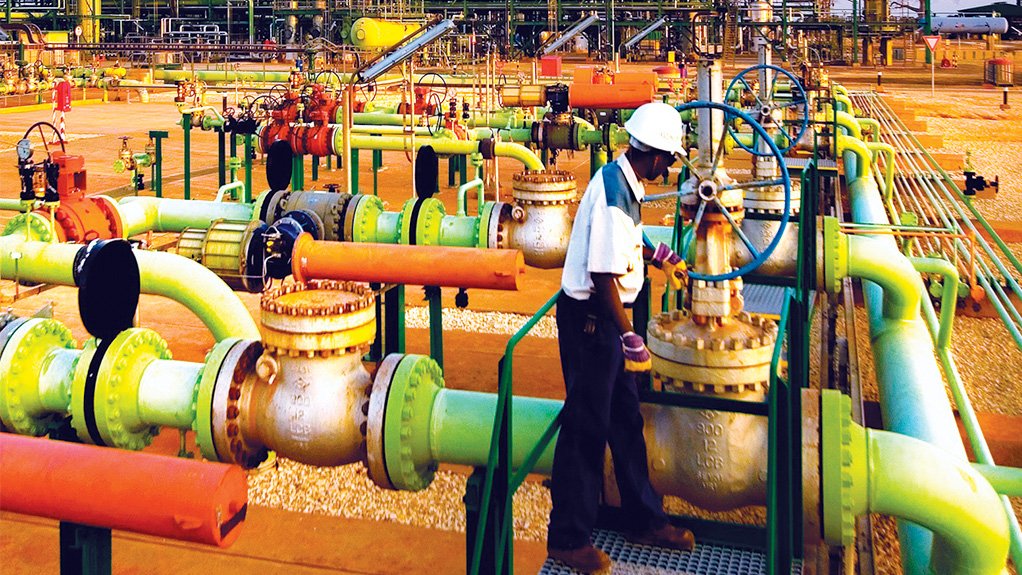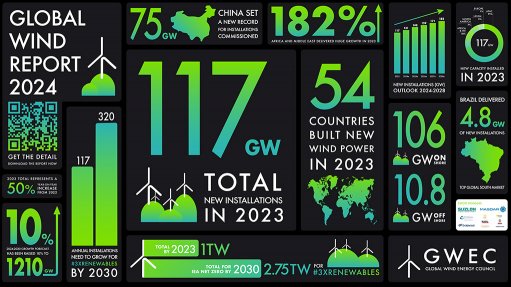Local gas sector small but to emerge


EMERGING GAS SECTOR For South Africa to switch to a gas-based economy, infrastructure is required to bring gas onshore
The South African gas sector is currently small, compared with global standards, but there are several signs of the local sector starting to emerge, says international executive search firm Odgers Berndtson.
A few decades ago, gas in major city centres of South Africa used to be supplied to residential and commercial users by pipes through urban networks for use in household heating and cooking, says Odgers Berndtson energy, consumer and technology specialist for sub-Saharan Africa Guy Lundy.
However, he notes that this relatively medium-scale gas network has vastly diminished, owing to poor maintenance of the urban gas infrastructure, with the bulk of gas being used residentially and commercially coming from liquid petroleum gas (LPG), which is transported and stored in pressurised gas bottles instead of a piped network.
Alternatively, natural gas is imported into South Africa from Mozambique through petrochemicals company Sasol’s gas pipeline. Another source of local natural gas comes from the offshore Mossgas platform, but Lundy says these sources of natural gas are limited quantities used in industrial applications.
He notes that the gas sector has remained so small because South Africa has relied on its abundance of coal reserves, which, in turn, have been used in State-owned power utility Eskom’s baseload power stations for electrical power generation.
Subsequently, it is this historic oversupply of electricity that led to the uptake in electrical stoves and electrical heaters for household use, which has led to a gradual decrease or limited uptake in gas appliances, such as gas stoves, gas geysers and gas heaters. Therefore, the uptake of gas in South Africa, in general, has been weak until recently.
This limited acceptance of gas also led to a limited construction of the associated gas infrastructure in South Africa.
Further, because South Africa does not have significant natural gas reserves, onshore or offshore, industry has been prompted to import gas for domestic requirements.
However, Lundy says that for South Africa to switch to a gas-based economy, infrastructure is required to bring gas onshore.
“Steps have been taken to bring gas into South Africa, such as through LPG company Avedia Energy, which has a gas plant in Cape Town and is currently building an LPG import facility in Saldanha,” he says, adding that this facility is expected to handle about 8 000 t/y of LPG.
This LPG is likely to come from gas-rich regions, such as Qatar and Iran, in the Middle East.
The Future of Gas
Lundy highlights the extraction of gas from oil rigs, where gas was previously burnt off as a by-product of oil production, as an interesting development in the global gas sector.
Gas flaring from oil rigs has been a common sight over the years, owing to the limited space aboard offshore oil rigs, which led to the use of singular technology to only process oil. Recent trends have shown that oil companies are no longer flaring gas from oil reserves and these gas reserves are being stored.
“Worldwide, industries are increasingly focusing on gas and, in this regard, a company like [petrochemicals major] Shell is clearly moving away from oil and more towards gas,” he says.
Lundy highlights the April takeover of UK gas company British Gas by Shell as a move by the petrochemicals giant to extend its gas portfolio. “Therefore, while Shell is announcing several thousand job losses in the oil sector as a result of low oil prices, they are sustaining jobs in the gas sector. This only stands to reinforce the global shift in attention from a traditional reliance on oil to a recent shift in focus to gas.”
He says the same situation is likely to happen in South Africa. As the price of gas becomes more affordable, the technology to obtain and use gas will subsequently improve, leading to a significant uptake in gas. “If gas infrastructure is developed in South Africa, it will enable the country to become far more reliant on gas.”
Lundy says the major advantage of gas is its clean-burning qualities, compared with other fossil fuels, such as coal and oil. “Gas produces about half the amount of carbon dioxide compared with coal.”
Lundy further notes that Qatar has completely transformed its economy to revolve around gas, adding that the US – which uses hydraulic fracturing to obtain gas – has become energy independent with the uptake of shale gas in its economy, instead of importing oil from Venezuela, Nigeria and Iraq.
Meanwhile, Engineering News reported last week that these were indications that South Africa’s much-neglected gas industry might start seeing renewed activity, as Energy Minister Tina Joemat-Pettersson pushes forward her ambitions for immediate focus to shift to the development of gas-sourced power, alongside the successful renewable-energy procurement programme. Speaking at a media briefing in Pretoria, she said the Department of Energy (DoE) was finalising the Integrated Energy Master Plan and the Gas Utilisation Master Plan (Gump), which would be the backbone of the gas industry. “We have made our commitments. We have committed to the development of the gas indus- try and the renewable-energy [sector], which needs to be connected to the grid,” she said. “We have paid little attention to gas . . . We have been preoccupied with nuclear,” she added, pointing to the fact that South Africa already had a large nuclear base off which to build. While the Minister did not provide further clarity, it seemed the country’s nuclear plans would be pushed through as a long-term ambition, with the funding mechanism still to be determined by the National Treasury.Comments
Press Office
Announcements
What's On
Subscribe to improve your user experience...
Option 1 (equivalent of R125 a month):
Receive a weekly copy of Creamer Media's Engineering News & Mining Weekly magazine
(print copy for those in South Africa and e-magazine for those outside of South Africa)
Receive daily email newsletters
Access to full search results
Access archive of magazine back copies
Access to Projects in Progress
Access to ONE Research Report of your choice in PDF format
Option 2 (equivalent of R375 a month):
All benefits from Option 1
PLUS
Access to Creamer Media's Research Channel Africa for ALL Research Reports, in PDF format, on various industrial and mining sectors
including Electricity; Water; Energy Transition; Hydrogen; Roads, Rail and Ports; Coal; Gold; Platinum; Battery Metals; etc.
Already a subscriber?
Forgotten your password?
Receive weekly copy of Creamer Media's Engineering News & Mining Weekly magazine (print copy for those in South Africa and e-magazine for those outside of South Africa)
➕
Recieve daily email newsletters
➕
Access to full search results
➕
Access archive of magazine back copies
➕
Access to Projects in Progress
➕
Access to ONE Research Report of your choice in PDF format
RESEARCH CHANNEL AFRICA
R4500 (equivalent of R375 a month)
SUBSCRIBEAll benefits from Option 1
➕
Access to Creamer Media's Research Channel Africa for ALL Research Reports on various industrial and mining sectors, in PDF format, including on:
Electricity
➕
Water
➕
Energy Transition
➕
Hydrogen
➕
Roads, Rail and Ports
➕
Coal
➕
Gold
➕
Platinum
➕
Battery Metals
➕
etc.
Receive all benefits from Option 1 or Option 2 delivered to numerous people at your company
➕
Multiple User names and Passwords for simultaneous log-ins
➕
Intranet integration access to all in your organisation


















